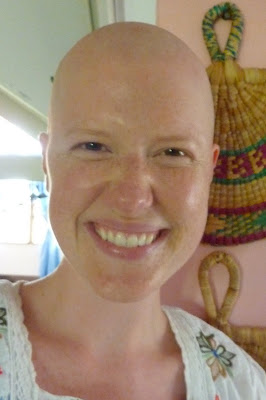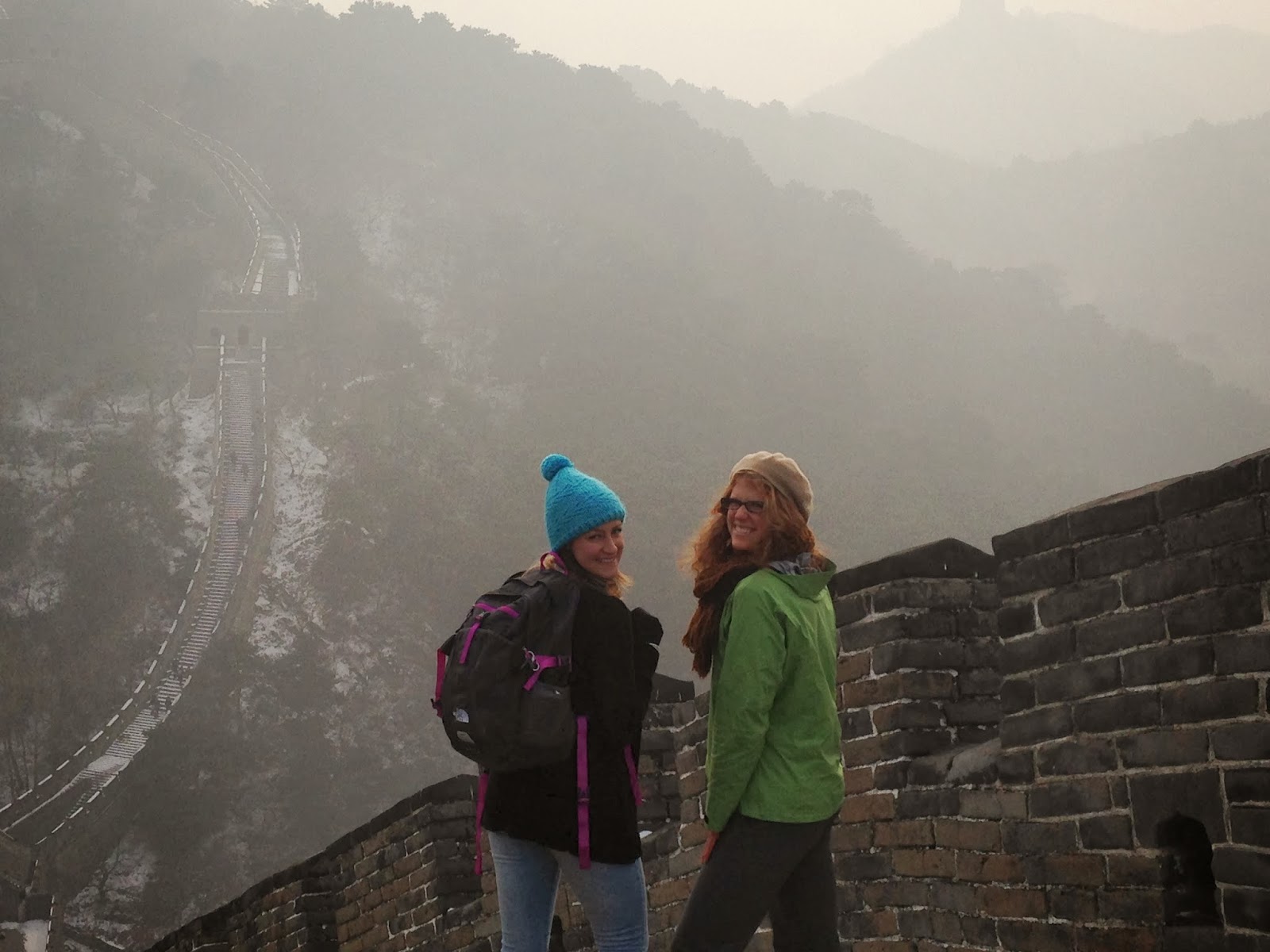Two Midwestern Women Cook Fried Chicken in Senegal
Making fried chicken was never one of my culinary goals—I
hate frying food—until one of my Senegalese brothers requested this “typical”
American recipe. I asked my mom to bring from the U.S. an enormous can of
Crisco ®—apparently makes the best fried chicken—which we used to fry pieces of
freshly plucked chicken, eviscerated of all the many parts Americans never
consider when buying a whole chicken at the supermarket. What I love most about
Senegal is how raw the eating conditions can be from time to time.  I perceive
that Americans are much too disconnected from the alimentary processes of daily
living: we buy meat nicely wrapped and packaged with no idea where it has come
from; our vegetables look and taste like wax because the image of what looks
nice must be upheld; we live in a disinfected bubble with our fear of germs. My
refrain was, “Mom, just don’t think about it.” Sometimes when faced with
differences in cultural eating habits in Senegal, it is best to sit down around
the bowl, smile and not think about all the fingers sharing your space. The way
in which my mom dove into the traditional eating practices embodied her
approach to the onslaught of cultural dissimilarities she experienced.
I perceive
that Americans are much too disconnected from the alimentary processes of daily
living: we buy meat nicely wrapped and packaged with no idea where it has come
from; our vegetables look and taste like wax because the image of what looks
nice must be upheld; we live in a disinfected bubble with our fear of germs. My
refrain was, “Mom, just don’t think about it.” Sometimes when faced with
differences in cultural eating habits in Senegal, it is best to sit down around
the bowl, smile and not think about all the fingers sharing your space. The way
in which my mom dove into the traditional eating practices embodied her
approach to the onslaught of cultural dissimilarities she experienced.
 I perceive
that Americans are much too disconnected from the alimentary processes of daily
living: we buy meat nicely wrapped and packaged with no idea where it has come
from; our vegetables look and taste like wax because the image of what looks
nice must be upheld; we live in a disinfected bubble with our fear of germs. My
refrain was, “Mom, just don’t think about it.” Sometimes when faced with
differences in cultural eating habits in Senegal, it is best to sit down around
the bowl, smile and not think about all the fingers sharing your space. The way
in which my mom dove into the traditional eating practices embodied her
approach to the onslaught of cultural dissimilarities she experienced.
I perceive
that Americans are much too disconnected from the alimentary processes of daily
living: we buy meat nicely wrapped and packaged with no idea where it has come
from; our vegetables look and taste like wax because the image of what looks
nice must be upheld; we live in a disinfected bubble with our fear of germs. My
refrain was, “Mom, just don’t think about it.” Sometimes when faced with
differences in cultural eating habits in Senegal, it is best to sit down around
the bowl, smile and not think about all the fingers sharing your space. The way
in which my mom dove into the traditional eating practices embodied her
approach to the onslaught of cultural dissimilarities she experienced.
From my diverse travels, I have become quite accustomed,
maybe even desensitized, to any sort of cultural change that might exist. I
remark upon cultural variation, but never do I balk or question what is
necessary; I observe and I do. For my mom, every cultural divergence that
emerged was glaring; I even made her a survival kit: toilet paper and mints to
cut the spicy food. With my substantial understanding of Senegalese culture, I
was able to tease apart various situations she may happen upon; but I give the
majority of the credit to my mother. Never once did she refuse to go somewhere
or do something or enter into a vehicle (public transport included). She
seamlessly dealt with the language barrier, reveled in the myriad encounters
with my host family and my friends and patiently soaked in all that transpired
around her.
The itinerary I fixed was quite full and duel-purposed (I’m
going to give you a play-by-play): I wanted her to meet my family and friends,
while seeing the beautiful Senegalese countryside. The first part of the trip
we spent running around Dakar: Friday, we ate lunch at Pikine and had dinner
with my aunt and uncle from Yoff at the most western tip of Africa in Les
Almadies; Saturday, we spent the day (seven hours for just the cooking time)
preparing for our fried chicken feast in Pikine for about 40 people, exploring
the extensive local market, dodging cars on Tally Bou Mack and dancing to a
local tam-tam band that came by to play for us; Sunday, four of my brothers and
sisters from Pikine accompanied us to Gorée Island where we learned about the
Atlantic Slave Trade from 1523 to 1848, after which we climbed up to the
Lighthouse of Mermelles and went out to dinner with my friends; and to crown
the very busy first part, Monday was an even longer day than the rest, finding
us early—5:45 am until 9 am—at one of the largest fish markets in West Africa
to see the unloading of the fresh catch of the day and to taste four versions
of an authentic Senegalese breakfast with two of my host sisters who sell
breakfast to all the workers and passersby and traveling to the Pink Lake with
a roundabout-and-not-so-on-the-way stop in Sebikotan to visit another aunt.
For the second part of the trip, Tuesday brought us out of
the haze and craze of Dakar to the peaceful area of Sandiara, in the Mbour
region. We spent the day on the Beersheba Project farm before traveling to Mar
Island, in the Sine-Saloum Delta. Giving my mom the opportunity to breathe and
take her experience in fully, we rested and basked in the tranquility of our
surroundings, exploring by small boats called pierogues and by horse cart all
that the delta had to offer. We saw pelicans and assorted colorful birds that
reminded me of God’s grace and admired the brilliant stars that speckled the
night sky with pinpoints of regal light.
 Until Saturday morning, we luxuriated
in paradise, surrounded by kind people and embellished with tantalizing, fresh
fish and accompanying cuisine. After a dusty, four hour mini-car ride back to
Dakar on Saturday, we went to my church to celebrate my mom’s arrival and pray
for the safety of her departure with some local treats and juices before
returning to Pikine to say good-bye to the family. What an eight-day trip! My
mother saw, smelled, felt and observed a Senegal most tourists never
appreciate, and that was my ultimate goal.
Until Saturday morning, we luxuriated
in paradise, surrounded by kind people and embellished with tantalizing, fresh
fish and accompanying cuisine. After a dusty, four hour mini-car ride back to
Dakar on Saturday, we went to my church to celebrate my mom’s arrival and pray
for the safety of her departure with some local treats and juices before
returning to Pikine to say good-bye to the family. What an eight-day trip! My
mother saw, smelled, felt and observed a Senegal most tourists never
appreciate, and that was my ultimate goal.







Comments